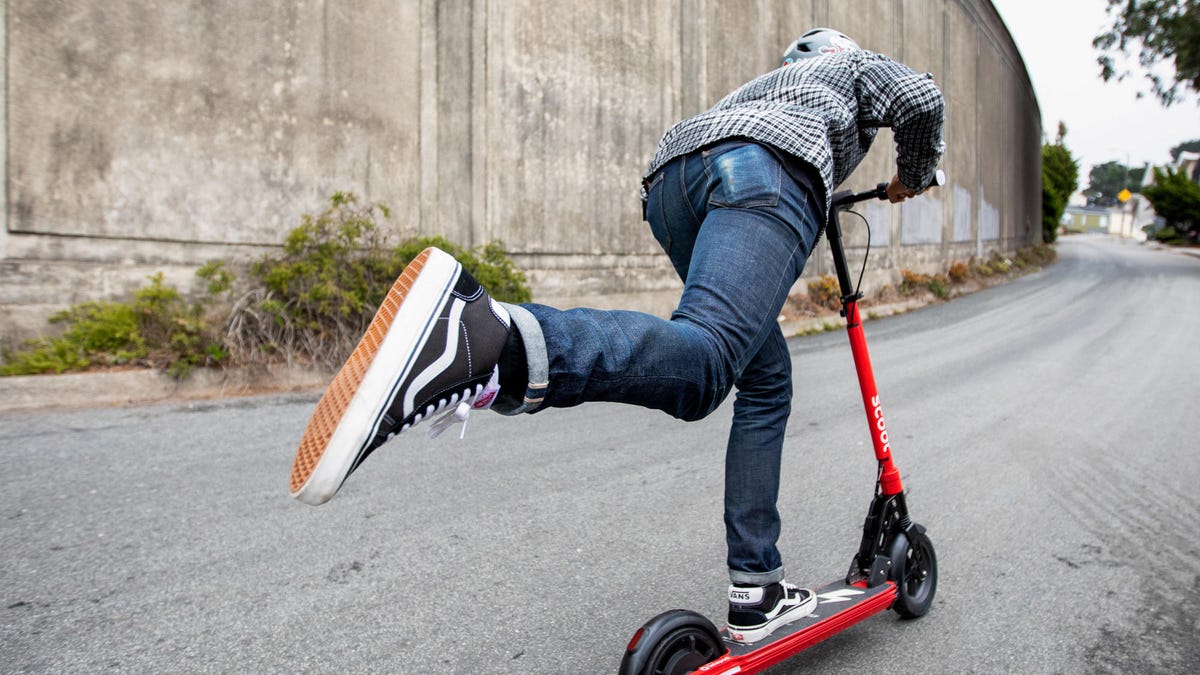Electric scooters had this city freaked out, and now they're back
Scoot and Skip roll out in San Francisco but Lime, Uber, Spin and Lyft aren't happy about it.

Scoot and Skip are bringing 1,250 electric scooters to San Francisco on Monday.
After a four-month hiatus, electric scooters are back on the streets of San Francisco.
Once again, people are able to hop on one of the vehicles -- paying $1 per rental plus about $0.15 per minute -- and scoot block to block at up to 15 mph.
But things are a bit different this time around.
After a crackdown by city officials, only two companies -- Scoot and Skip -- are allowed to deploy their scooters onto San Francisco's streets and there'll be fewer scooters than there were four months ago. That means the cluttered sidewalks residents complained about during the initial scooter rollout should be somewhat alleviated.
"We are ready to extend our offering in San Francisco to provide another fun, fast, affordable way for citizens to get around," Scoot CEO Michael Keating said in an email. "We look forward to continuing to partner with the city to responsibly manage this new mode of transportation."
Hundreds of cities across the US now have these dockless, rentable electric scooters, but San Francisco was one of the first cities to get them. In March, three companies -- Bird, Lime and Spin -- unleashed roughly 2,000 electric scooters onto San Francisco's streets, surprising both lawmakers and local residents.
Some people took to the scooters immediately, loving the convenient way to get around the congested city. Others hated them, calling the scooter phenomenon by many names: Scootergeddon, Scooterpocalypse and Scooter Wars. Some expressed their rage by tossing the scooters into trash cans, hanging them from trees and even smearing them with feces.
By April, San Francisco regulators had had enough. The city passed a law to regulate the scooters, limiting the amount to 1,250 and requiring companies to get a permit to operate them. Twelve companies applied, including Bird, Lime, Spin, Lyft and Uber's Jump, for five possible permits. But, in the end, regulators only gave out permits to two companies that had worked with the city from the beginning.
"This time around e-scooters are coming back to San Francisco on the city's terms," said Thom Rickert, an emerging risks specialist for public sector consulting company Trident Public Risk Solutions. "Safety and integration into the city's current transportation plan were key concerns of the community that San Francisco's leaders sought to address."
The San Francisco Municipal Transportation Agency (SFMTA) that granted the scooter permits said Scoot and Skip's applications best outlined a priority on safety, disabled access, equity and accountability. For example, Scoot offers a job training program and low-income pricing for people who qualify; and Skip created a hotline for people to call in with concerns and requests, as well as a community advisory board.
"It's been hard work, but we've stayed true to our values of working with community groups and municipal governments to ask permission, not forgiveness," Skip CEO Sanjay Dastoor said in an email. "We know that a successful pilot program depends on more than getting Skips out on the streets."
City regulators said Scoot and Skip had the strongest applications. But Lime, Lyft, Uber's Jump and Spin felt spurned. While Spin and Jump filed appeals with the city, Lyft's president John Zimmer took a softer approach by writing a letter to Mayor London Breed asking her to reconsider.
"Lyft put forward a compelling application that stood out in its approach to equity to best serve San Francisco residents," Caroline Samponaro, Lyft's head of bike, scooter and pedestrian policy, said in an email. "We remain hopeful that we will have the chance to offer scooters in San Francisco in the future."
Lime, on the other hand, took a hard-line approach claiming the city was biased against it. The company filed a lawsuit asking for a temporary restraining order on the deployment of Scoot and Skip's scooters. Last week, a judge denied Lime's request but is allowing for a public hearing on the issue in mid-November.
"Our decision to file this lawsuit was not about preventing other operators from going forward," a Lime spokesman said in an email. "It was about exposing the biased and flawed process of the SFMTA, standing up for the rule of law, and serving Lime's hometown."
As these legal issues continue to shake out, however, Scoot and Skip's scooter programs will be well underway.
Uber didn't respond to request for comment.
First published Oct. 15, 9:21 a.m. PT.
Update, 12:36 p.m.: Adds comment from Thom Rickert.
The Smartest Stuff: Innovators are thinking up new ways to make you -- and the world around you -- smarter.
CNET Magazine: Check out a sampling of the stories you'll find in CNET's newsstand edition.

